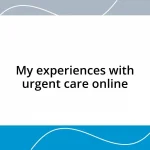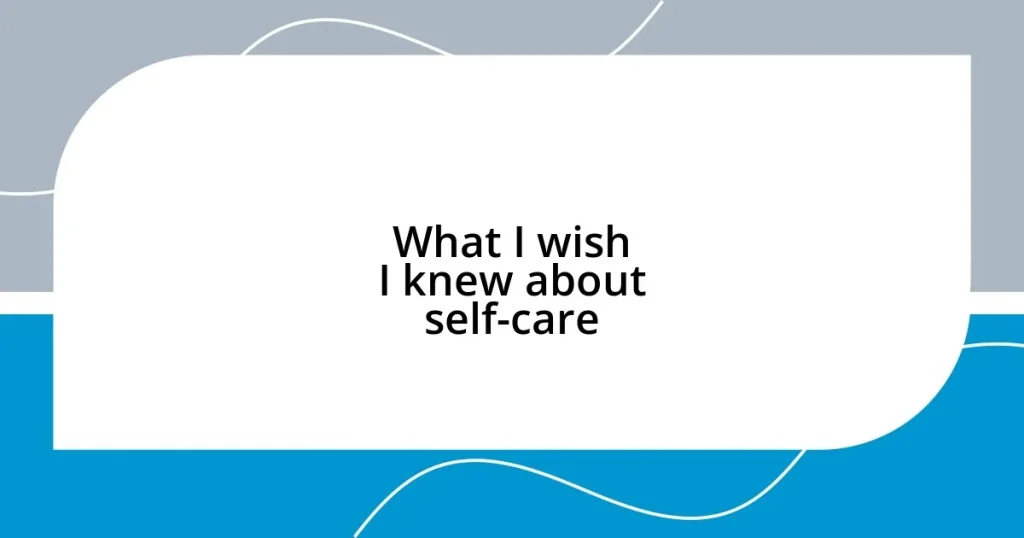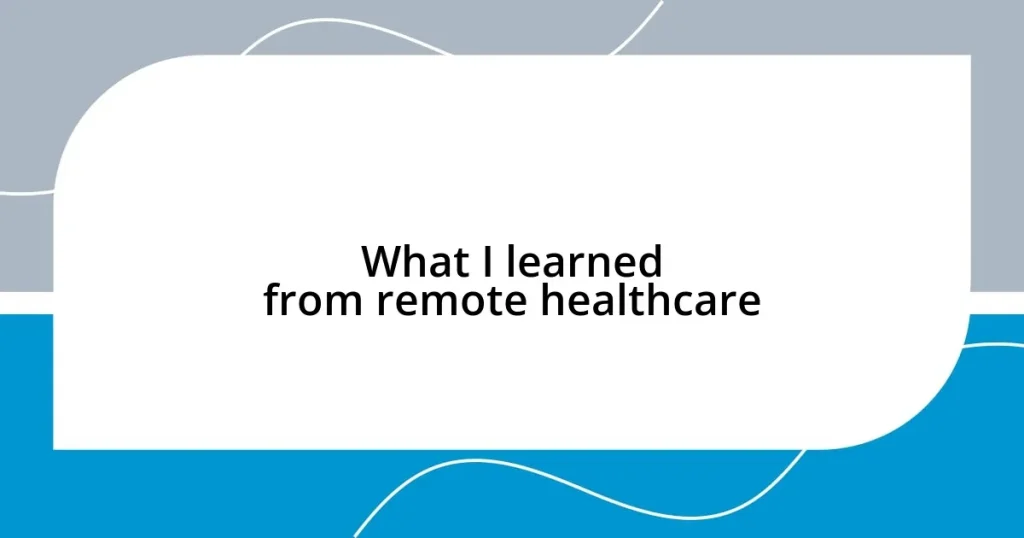Key takeaways:
- Self-care enhances overall well-being, mood, and productivity while improving relationships and resilience to stress.
- Identifying personal self-care needs is essential for creating a tailored routine that evolves over time.
- Common misconceptions about self-care include viewing it as selfish, needing to be expensive or time-consuming, and thinking it’s a one-time fix.
- Building a sustainable self-care plan requires knowing one’s needs, being flexible, and involving others for accountability and enjoyment.
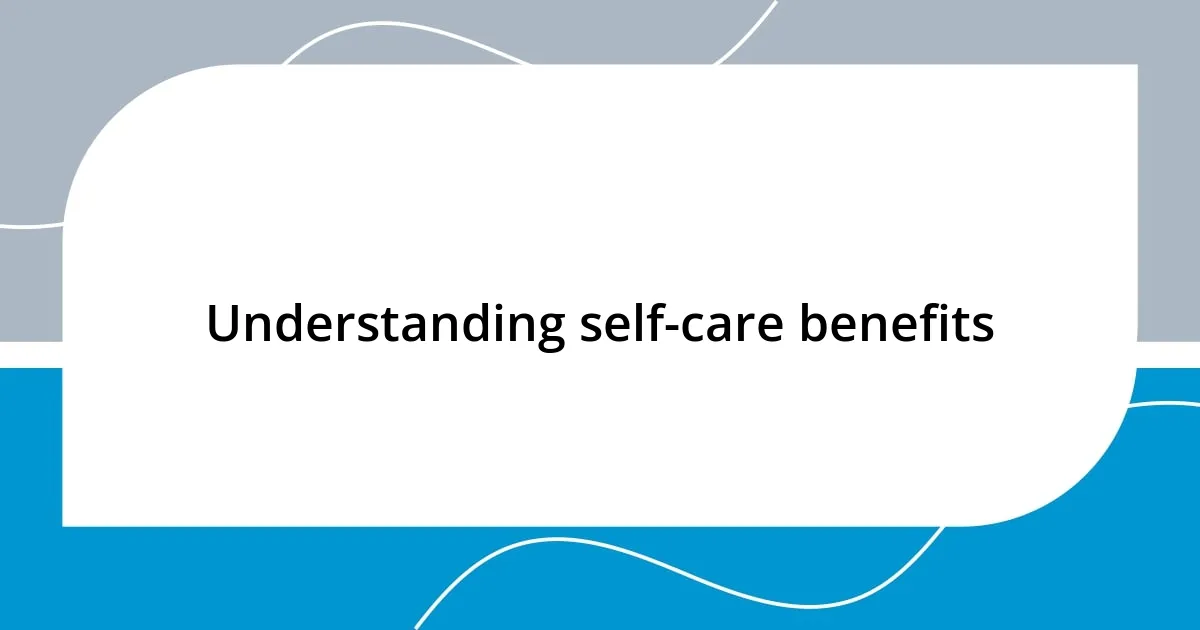
Understanding self-care benefits
Self-care offers a multitude of benefits that can significantly enhance our overall well-being. I remember a time when I was overwhelmed with work and neglecting my needs. When I finally carved out time for a simple evening walk, it felt like a breath of fresh air, both physically and mentally. Could it be that just dedicating those moments to myself improved my mood and productivity?
Engaging in self-care doesn’t just boost our mental health; it can also improve our relationships. After I started practicing mindfulness, I noticed that I was more present and patient with my loved ones. Have you ever felt the difference in how you relate to others when you take care of yourself first? It was as if I was recharging my emotional batteries and allowing myself to connect with those around me on a deeper level.
It’s fascinating how self-care can also help us resist stress better. I used to feel like stress was a constant companion until I made self-care a priority. Now, when challenges arise, I remind myself that I’ve equipped my mind and body to handle pressure more effectively. Isn’t it empowering to know that by prioritizing ourselves, we become more resilient in facing life’s curveballs?
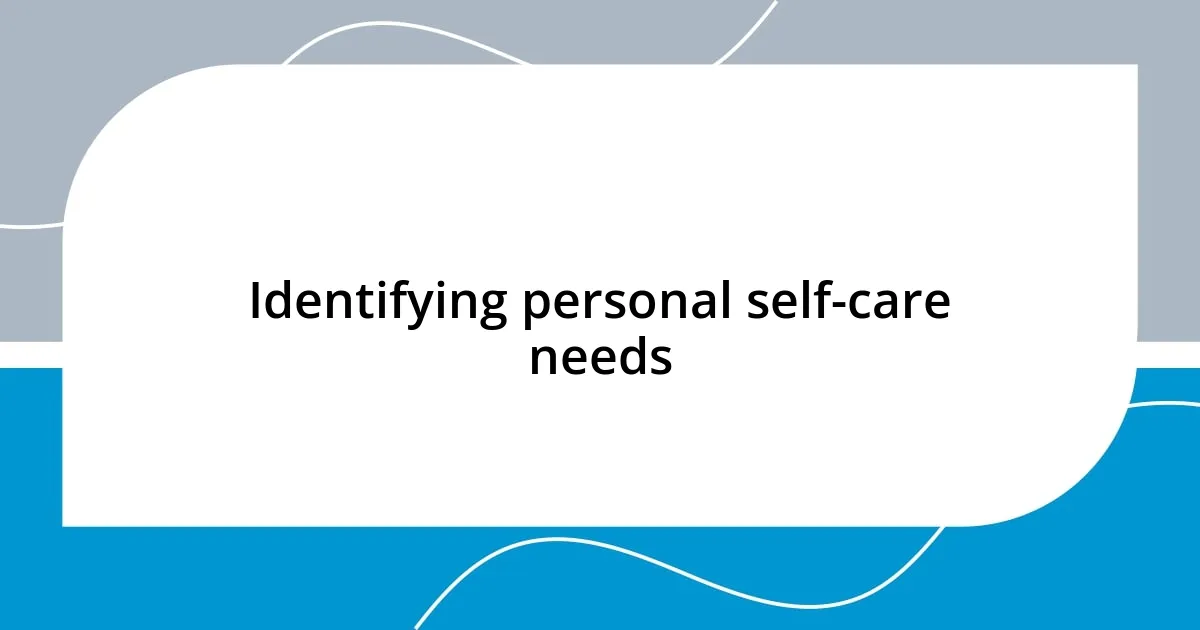
Identifying personal self-care needs
Identifying your personal self-care needs is like discovering a secret map to your well-being. I recall a particularly draining week where I was juggling too many responsibilities, and I realized I hadn’t taken a moment to check in with myself. It struck me that my needs were unique; they weren’t the same as my friends’ or my family’s. This realization helped me pinpoint what I truly needed—be it a quiet hour with a book or some quality time spent with my favorite hobby.
When I began to tune into my feelings, it became easier to express my self-care needs. I remember feeling completely overwhelmed during a busy work period, yet I discovered that just 10 minutes of meditation made a world of difference. Reflecting on my individual needs encouraged me to keep track of what rejuvenated my spirit. Have you ever noticed how a quick getaway from daily stressors unexpectedly brightens your mood? It’s vital to recognize that self-care isn’t one-size-fits-all; our journeys are deeply personal and evolve over time.
Taking small steps towards understanding what self-care means for you can be transformative. For instance, I once wrote down a list of activities that sparked joy and relaxation—things like hiking, painting, or even just listening to music. Comparing these activities against my levels of stress and happiness became an introspective process. What did I gravitate towards during stressful days? What felt like a chore? This reflection is key to tailoring a self-care routine that truly resonates.
| Self-Care Activities | Personal Needs Addressed |
|---|---|
| Evening Walks | Physical rejuvenation |
| Hobbies | Emotional fulfillment |
| Meditation | Mental clarity |
| Quality Time with Friends | Social connection |
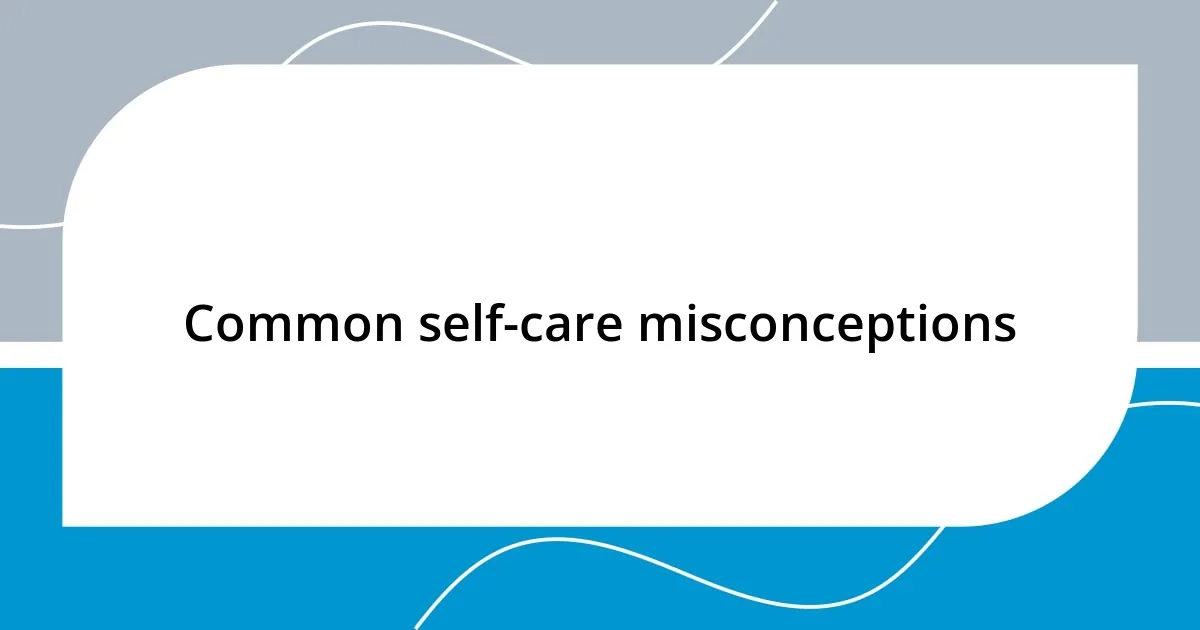
Common self-care misconceptions
Self-care is often misunderstood, leading to various misconceptions that can hinder our well-being. For instance, I used to think that self-care meant indulging in luxurious spa days or expensive retreats. While those can be lovely, true self-care is often much simpler. When I prioritize a good book or a cup of herbal tea, I realize it’s the small, intentional moments that nourish my spirit.
Here are some common misconceptions that I’ve encountered:
- Self-care is selfish. Many people believe that taking time for themselves makes them selfish, but I’ve found it energizes my capacity to support others.
- Self-care requires a lot of time or money. Some think it can only be effective if you splurge, but I’ve discovered that a few mindful breaths can also be incredibly refreshing.
- Self-care is a one-time fix. I once thought self-care would solve my stress permanently, but it’s a continuous journey that requires regular reflection and adjustment.
Another misconception is that self-care is simply about relaxation. I remember feeling guilty when I focused on self-care and overlooked daily tasks. However, I soon learned that self-care isn’t just about unwinding; it’s also about building habits that promote long-term health. On days when I commit to exercising, even if just for 20 minutes, I notice a marked increase in my energy and focus.
Consider these realities that can better shape your understanding of self-care:
- Self-care includes setting boundaries. I’ve found that saying no to extra commitments often leads to a healthier mental space.
- Not all self-care feels good in the moment. Sometimes, addressing deeper issues—like seeking therapy—can be a challenging yet necessary form of self-care.
- It’s okay to prioritize your needs over others. I’ve discovered that when I foster my well-being first, I can show up more fully for those I love.
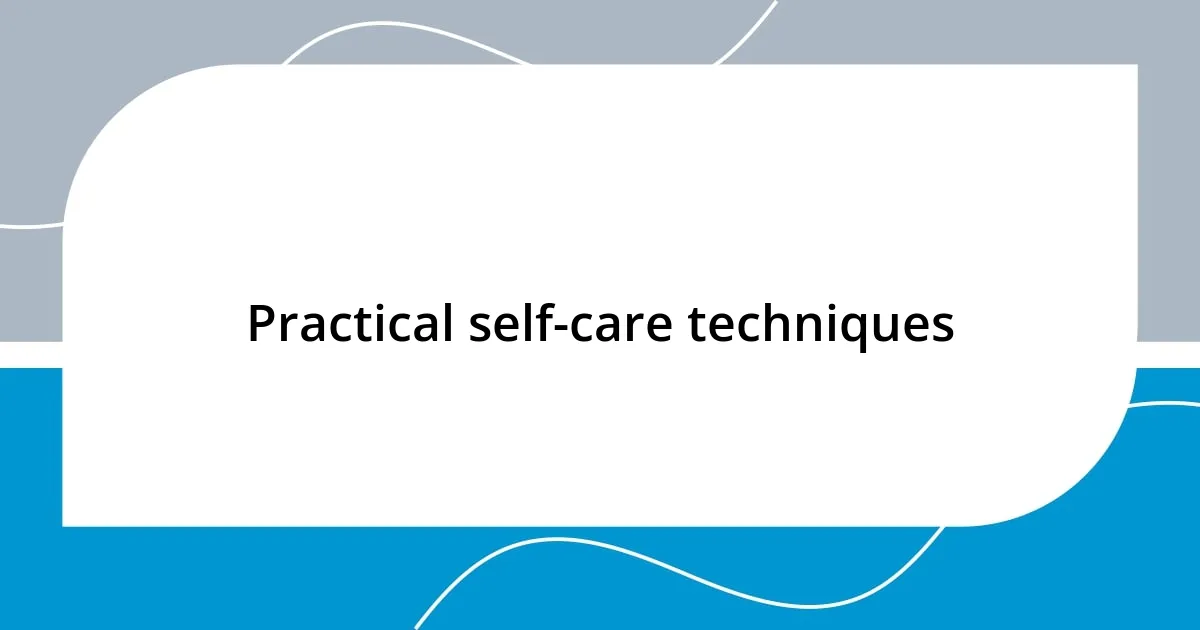
Practical self-care techniques
When it comes to practical self-care techniques, I find that incorporating small rituals into my daily routine can yield significant benefits. For instance, I started the habit of morning journaling, which allows me to express my thoughts and set intentions for the day. It might seem straightforward, but this practice has given me a clear perspective on what I want to achieve and how I’m feeling each day.
Another technique I swear by is the ‘5-4-3-2-1 grounding exercise.’ When I’m feeling anxious, I quickly take a moment to name five things I can see, four I can touch, three I can hear, two I can smell, and one I can taste. This simple exercise not only distracts me from overwhelming feelings but also reconnects me with my surroundings. Have you ever noticed how quickly such grounding practices can shift your mindset?
I also urge you to experiment with a digital detox—trust me, it’s refreshing! I recently dedicated one weekend each month to disconnecting from screens. Surprisingly, I found myself enjoying activities I often neglected, like cooking or rediscovering old hobbies. It’s amazing how much clarity and space we find when we step back from constant notifications. What techniques have you found effective in reclaiming your own time?
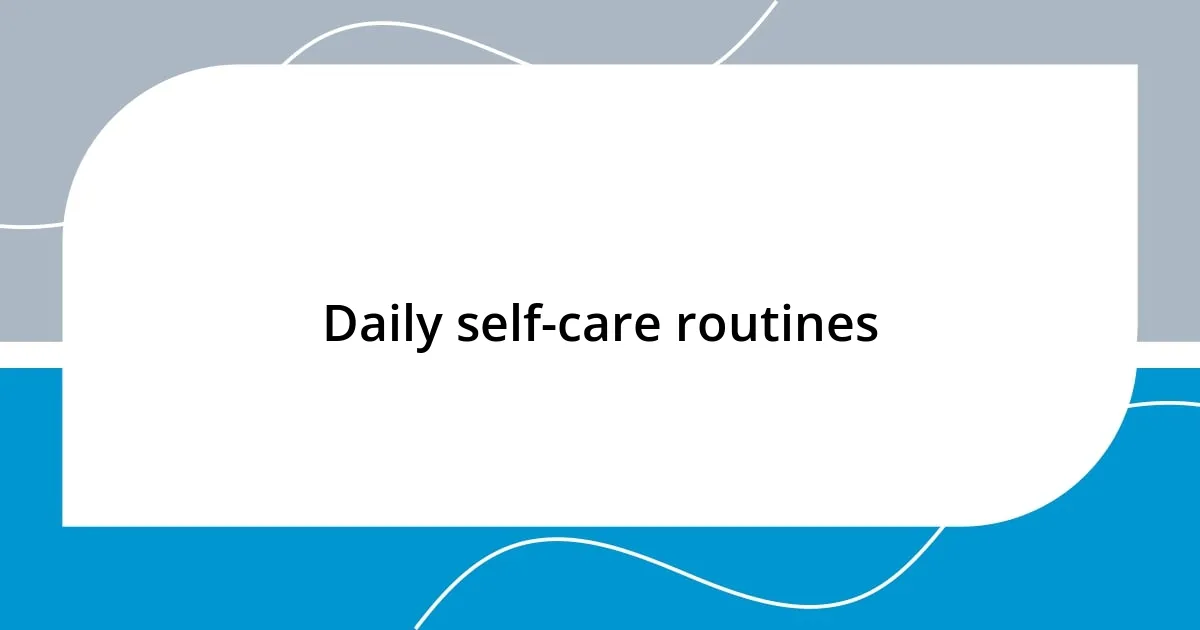
Daily self-care routines
Establishing a daily self-care routine has truly transformed my life. I’ve learned that even the simplest rituals can make a profound difference. For example, I dedicate a few minutes every morning to stretch and breathe deeply, which has not only improved my physical flexibility but also set a positive tone for the day. Isn’t it fascinating how such small actions can ripple through our entire routine?
I experimented with creating a “wind-down” ritual in the evening, and it’s become a cherished part of my day. As I sip my favorite herbal tea, I let the day’s stresses melt away. This peaceful moment allows me to reflect on my day without distractions. Have you ever had a moment that felt like a warm hug for your mind? I definitely do during this time, and it’s something I prioritize, knowing it enriches my sleep and emotional well-being.
Getting outdoors is another fundamental aspect of my daily routine. I usually combine this with a short walk after lunch. Not only does the fresh air invigorate me, but the change of scenery also sparks creativity. The other day, I noticed how that simple act of getting outside lifted my mood significantly. What’s one outdoor experience that made you feel alive? For me, those moments remind me of the importance of connecting with nature, no matter how brief.
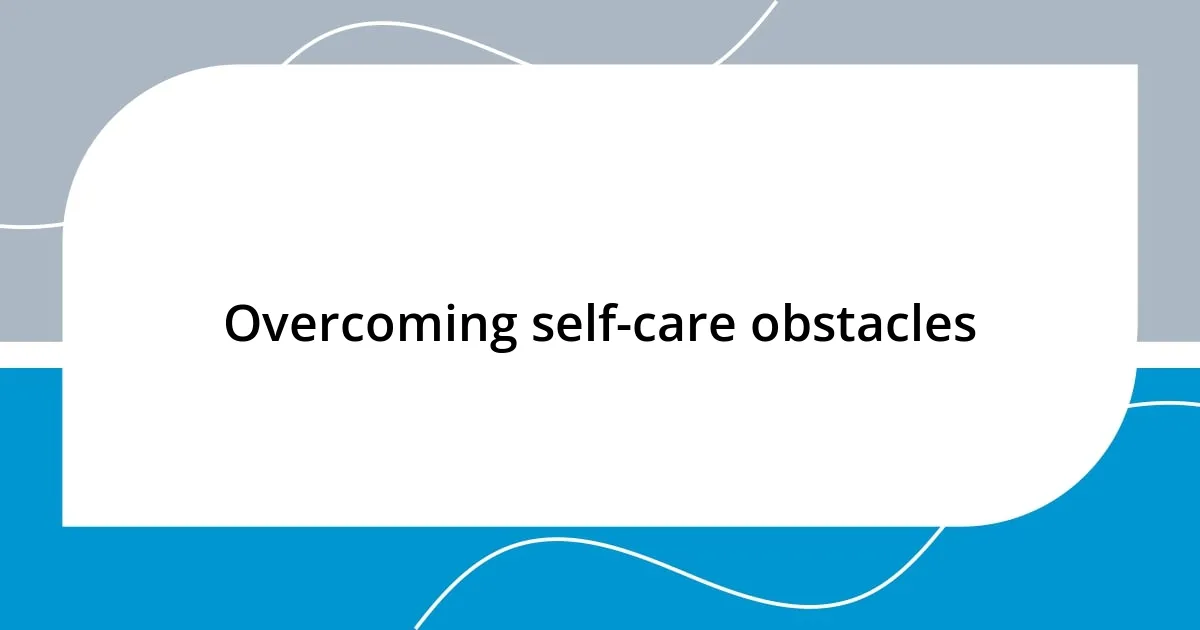
Overcoming self-care obstacles
It’s easy to underestimate the hurdles we face in maintaining self-care. I, for instance, often battle the guilt of taking time just for me, especially when there are so many responsibilities pulling at my attention. Have you ever felt that voice in your head that says you should be doing something more productive? I’ve learned that recognizing this guilt is the first step in overcoming it. By reminding myself of the importance of recharging, I’ve found the courage to prioritize self-care without remorse.
Time constraints can also feel like a significant barrier. I remember a period where my schedule was jam-packed, and I convinced myself that self-care had to wait. However, I discovered that even short self-care bursts—the kind that only takes five or ten minutes—could work wonders. Whether it’s stepping outside for fresh air or enjoying a few moments of deep breathing, these micro-practices have helped me reclaim my day, making me feel more centered and ready to engage.
Sometimes, the biggest obstacle is our own mindset. I’ll be honest; there were times when I felt unworthy of self-care, thinking, “Isn’t there always someone else who needs my attention first?” Yet, embracing the idea that self-care is not selfish but necessary was a game-changer for me. Have you ever considered how your well-being has a ripple effect on those around you? Investing in myself ultimately allows me to be more present and supportive for others, creating a positive cycle that lifts us all.
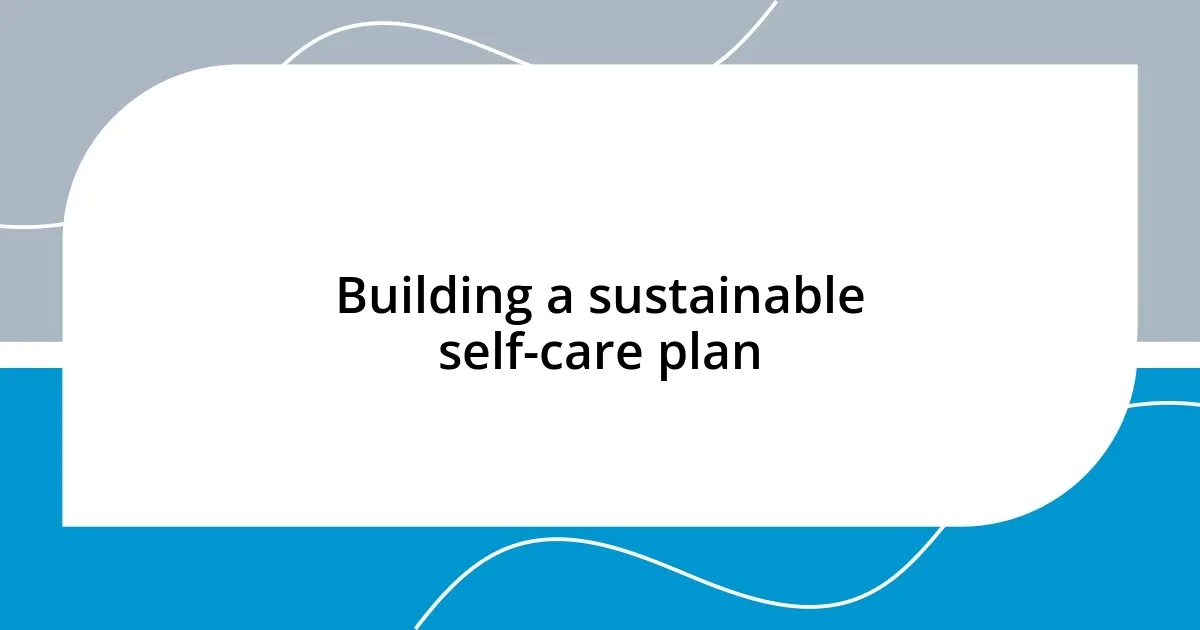
Building a sustainable self-care plan
Building a sustainable self-care plan starts with knowing your needs and limits. I remember creating a self-care calendar that visually reminded me to check in with myself weekly. I was surprised by how listing activities—like reading, yoga, or even simply enjoying a warm bath—made me more accountable. Isn’t it interesting how having a plan can turn self-care from an optional activity into a non-negotiable commitment?
Another key aspect I’ve realized is flexibility. While it’s tempting to stick to a rigid schedule, I’ve found that adapting my self-care practices to fit my mood and energy levels has made a huge difference. For instance, some days I may feel invigorated and ready for a vigorous workout, while on others, I crave a cozy night in with a good movie. Learning to listen to my body has transformed self-care from a chore into a comforting ritual. Isn’t it liberating to know that your self-care can ebb and flow just as you do?
Lastly, I think involving others can enrich your self-care journey. I’ve started inviting friends to join me for a virtual yoga class or a paint night at home. Sharing these experiences not only deepens connections but also holds me accountable. Have you ever discovered how much more rewarding activities can be when shared? It’s funny how self-care, which often feels like a solo journey, can become even more fulfilling through community.










